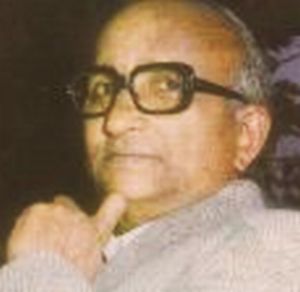 Gopalakrishna
Adiga was its great harbinger. He was born in Mogeri, Kundapur Tk, S. K.
district, Karnakaka. He obtained a Master's degree in English literature from
Mysore University. He joined the academic profession and held the position of
Principal, Lal Bahadur College, Sagar (1964-68) and Poorna Prajna College, Udipi
(1968-71). He also worked as Deputy Director (Editorial) in National Book Trust,
India. For some time, he functioned as the editor of Saakshi magazine. He
authored a number of publications, which include Bhavataranga, 1946,
Bhoomi Geetha, 1959, Vardhamana, 1972 and Idanna
Bayasiralilla, 1975 (poetry). He also wrote a novel, Anathe, 1954 and
a book of critical essays, Mannina Vasane, 1966. His Samagra Kavya
(Collected Poems) was published in 1976. is the pioneer of the
modernist movement in Kannada poetry. He led the Navya (New / Modernist)
movement, which was inspired by the literary modernism of the European literary
tradition. Indian independence in 1947 brought with it the promises of freedom
and a new genre sprouted in Kannada poetry. The torchbearer of this tradition
was Gopalakrishna Adiga. The Navya poets wrote about the disillusionment and
angst of the times. The sophistication in the use of language and the importance
of technique to poetry reached new heights in this genre. Even in the
perspective of Navya with its Western impact, Adiga's innovativeness and
the ability for re-harnessing elements of Indian tradition have to be noted.
Adiga's modernism also highlighted the individualistic experience of the Indian
middle-class and its aspirations and ideologies. But it was not limited there.
As Sumateendra Nadig has observed, Adiga's writings "reflected humanity".
Ramachandra Sharma and other major poets of Kannada have
carried the post-Adiga literary tradition forward. The Bandaya (the rebel) and
the Dalita (the oppressed) movements followed the Navya in Kannada. But the
stature of Gopalakrishna Adiga as the great master of Kannada poetry remains
undiminished. Adiga received the B M S Gold Medal for Poetry from Mysore
University (1941), Karnataka Sahitya Academy award (1973), Sahitya Akademi
award (1974) for his collection of poems, Vardhamaana, and the Kabir
Samman awarded by Madhya Pradesh Government. He was honoured, posthumously, with
Pampa Prashasthi (1993) by Karnataka Government.
Gopalakrishna
Adiga was its great harbinger. He was born in Mogeri, Kundapur Tk, S. K.
district, Karnakaka. He obtained a Master's degree in English literature from
Mysore University. He joined the academic profession and held the position of
Principal, Lal Bahadur College, Sagar (1964-68) and Poorna Prajna College, Udipi
(1968-71). He also worked as Deputy Director (Editorial) in National Book Trust,
India. For some time, he functioned as the editor of Saakshi magazine. He
authored a number of publications, which include Bhavataranga, 1946,
Bhoomi Geetha, 1959, Vardhamana, 1972 and Idanna
Bayasiralilla, 1975 (poetry). He also wrote a novel, Anathe, 1954 and
a book of critical essays, Mannina Vasane, 1966. His Samagra Kavya
(Collected Poems) was published in 1976. is the pioneer of the
modernist movement in Kannada poetry. He led the Navya (New / Modernist)
movement, which was inspired by the literary modernism of the European literary
tradition. Indian independence in 1947 brought with it the promises of freedom
and a new genre sprouted in Kannada poetry. The torchbearer of this tradition
was Gopalakrishna Adiga. The Navya poets wrote about the disillusionment and
angst of the times. The sophistication in the use of language and the importance
of technique to poetry reached new heights in this genre. Even in the
perspective of Navya with its Western impact, Adiga's innovativeness and
the ability for re-harnessing elements of Indian tradition have to be noted.
Adiga's modernism also highlighted the individualistic experience of the Indian
middle-class and its aspirations and ideologies. But it was not limited there.
As Sumateendra Nadig has observed, Adiga's writings "reflected humanity".
Ramachandra Sharma and other major poets of Kannada have
carried the post-Adiga literary tradition forward. The Bandaya (the rebel) and
the Dalita (the oppressed) movements followed the Navya in Kannada. But the
stature of Gopalakrishna Adiga as the great master of Kannada poetry remains
undiminished. Adiga received the B M S Gold Medal for Poetry from Mysore
University (1941), Karnataka Sahitya Academy award (1973), Sahitya Akademi
award (1974) for his collection of poems, Vardhamaana, and the Kabir
Samman awarded by Madhya Pradesh Government. He was honoured, posthumously, with
Pampa Prashasthi (1993) by Karnataka Government. B.C. Ramachandra Sharma (1925-2005) --- Ramachandra Sharma was a psychologist and educationist. He had lived in Ethiopia, England and Zambia before returning to India in 1982. His oeuvre includes eight collections of poems, four collections of short stories, four plays and two books of non-fiction. Among the honours he received are the Kailasam award and the Sahitya Akademi award (1998) for his collection of poems, Saptapadi.
G. S. Shivarudrappa --- G. S. Shivarudrappa did his Ph D under Kuvempu and the topic was Soundarya Sameekshe. He was a Professor of Kannada. He is the recipient of Pampa Prashasti award (1997), Kuvempu Award (2005) and A. Na. Kru. Nirman Award (2006). He received Sahitya Akademi award (1984) for Kavyartha Chintana (Literary criticism). He has been conferred an honorary doctorate degree by Mysore University.
Chandrasekhar Kambar (b. 1938) --- Chandrasekhar Kambar is a playwright, poet and novelist. He received the award of the Sangeet Natak Akademi (1983). His Jokumaraswamy was given Natya Sangha Award as the best play of the year in 1975 and Sirisampige (Play) got the Sahitya Akademi Award (1991). He held the positions of Vice-Chancellor of Kannada University and Chairperson of National School of Drama (1996-2000).